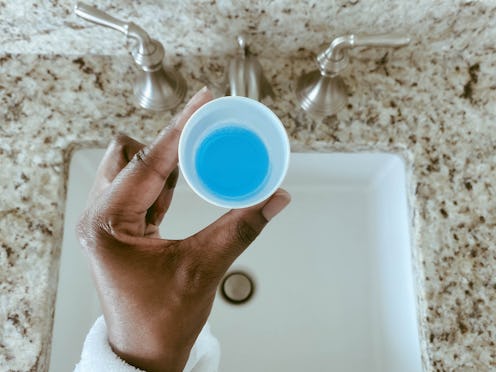Health
All The Reasons Why You Should Never Skip Your Mouthwash
Swish, swish.

You brush religiously and floss like you’re cleaning for a gold medal — but mouthwash has somehow never ended up on your sink counter. You just spit it out anyway, right? Dentists say that actually, mouthwash’s benefits make it an excellent complement to brushing and flossing.
“Mouthwash gives your mouth a clean, fresh feeling, but it also has benefits for your overall oral health,” Dr. Lauren McDonough, DMD, the vice president of practice support at Aspen Dental, tells Bustle. She adds that the American Dental Association recommends mouthwash as “a helpful addition to the daily oral hygiene routine for some people.”
The benefits of the mouthwash on your bathroom shelf depend on what kind you’ve got. Dr. Maha Yakob, Ph.D., senior director of professional and scientific affairs at oral care company quip, tells Bustle that there are two categories of mouthwash: therapeutic and cosmetic. Therapeutic ones contain active ingredients like fluoride, peroxide, cetylpyridinium chloride, sodium benzoate, and chlorhexidine, which are designed to combat plaque and other teeth nasties. Cosmetic mouthwashes will just reduce bad breath or whiten your teeth — which may be a benefit you’re looking for.
Therapeutic Mouthwash Can Help Prevent Cavities
Mouthwash with the right additives can help you avoid dentist trips. “Therapeutic mouthwash has active ingredients intended to help control or reduce conditions like bad breath, gingivitis, plaque, and tooth decay,” Dr. McDonough says.
Chlorhexidine can be used to help control plaque and gingivitis, she adds, while fluoride can strength your enamel and shield your teeth from acid damage (which can be caused by things like too many sodas or even kombucha). “It’s reaching parts of the mouth that brushing and flossing can’t easily access,” Dr. Yakob says. That’s why it can be so helpful in cavity prevention. If you’re looking for cavity preventative mouthwash, she advises looking for the word “fluoridated” on the label.
Mouthwash Improves Your Breath & Gums
Therapeutic mouthwashes, Dr. Yakob explains, can target particular issues. Some might be anti-cavity, while others will be antiseptic or antibacterial, and clear away the nasties that gather on your teeth and cause decay. One popular antibacterial mouthwash ingredient, chlorhexidine, targets gum health by killing the bacteria that can cause gingivitis, and also helps treat ulcers by stopping new ones from forming. Another, cetylpyridinium chloride, combats microbes that can create bad breath.
Interestingly, alcohol in mouthwashes doesn’t do much to fight bacteria, per McGill University, because its concentration tends to be so weak per dose.
Medicated Mouthwashes Treat Oral Health Conditions
If you have a condition that leads to bad breath or increases your risk of plaque, chances are that you’ll be prescribed a mouthwash to help you deal with it, Dr. McDonough says. “Specialized mouthwashes often help a great deal,” she says. Medicated mouthwashes may be prescribed to help with oral surgeries, chronic dry mouth, chronic sinus inflammations, acid reflux, or tonsil stones. You can also get mouthwashes to treat dental sensitivities, like serious pain whenever you bite into ice cream.
Cosmetic Mouthwash Won’t Help Clean Plaque Or Stop Cavities
“Cosmetic mouthwash may temporarily control bad breath and leave behind a pleasant taste, but have no chemical or biological application beyond their temporary benefit,” Dr. McDonough says. “For example, if a product doesn’t kill bacteria associated with bad breath, then its benefit is considered to be solely cosmetic.” Cosmetic mouthwash may contain carbamide peroxide, which is associated with whiter teeth, but won’t do much more than that.
Should You Brush Before Or After Mouthwash?
Even therapeutic mouthwashes need to be used in the correct order, Dr. McDonough says. “It is best used after the teeth are thoroughly cleaned by brushing and flossing,” she says. If it’s not used at the end of your brushing routine, you’ll risk flushing it away from your tooth and gums, which will mean it will lose some effectiveness. Optimum mouthwashing technique? Brush, floss, then swish, gargle, spit, and don’t rinse, Dr. McDonough says.
Mouthwash Alone Won’t Replace Brushing & Flossing
“Remember that mouthwash kills bacteria on the surface of the mouth and teeth; it does not address the underlying causes of bad breath or dental problems,” Dr. McDonough says. “Use it as a finishing rinse, but don’t expect it to cure all dental problems.”
Brushing and flossing are fundamental to tooth health, Dr. Yakob adds, so you can’t replace them with a simple mouthwash gargle-and-go routine. And when you’re picking out a mouthwash, look at the ingredients and check that it has the American Dental Association’s (ADA) seal of approval. “The seal assures you that you are using a mouthwash that will combat cavities and help prevent periodontal disease,” Dr. McDonough says.
Experts:
Dr. Lauren McDonough, DMD, the vice president of practice support at Aspen Dental
Dr. Maha Yakob, Ph.D., senior director of professional and scientific affairs at oral care company quip
This article was originally published on